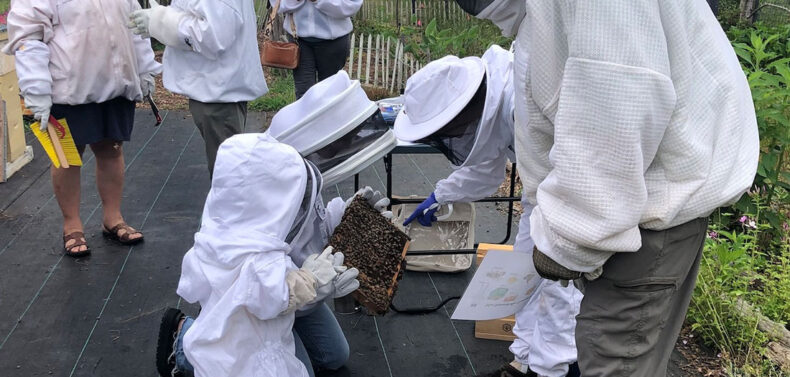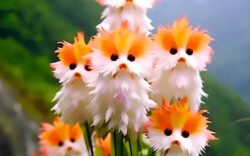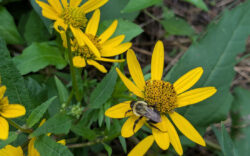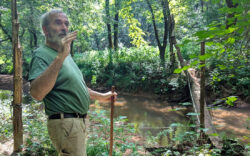This weekend, buzz over to the 2nd Annual Athens Honey Bee Festival for some free fun and a peek inside the world of bees. The festival will be held Saturday, May 24 from 10 a.m.–2 p.m. at the Athens-Clarke County Extension Office on Cleveland Road. It will include honey tasting, craft construction, and the opportunity to get up close and personal with honey bees.
The first honey bee festival last year was a success they’ve built on, said ACC Extension Agent Laura Ney. “We’ve added more educational booths and some more vendors,” she said.
One of the most popular activities last year was the chance to suit up and explore the extension office’s demonstration hives under the guidance of experienced beekeepers. “That filled up really fast last year,” Ney said. “So we’re doubling the amount that we can do this year.”
The public will be able to suit up eight at a time. Available protective beekeeping suit sizes range from large adult to child-sized suits that can fit a 4-year-old.
If suiting up sounds like a little too much for you, there’s also an observation hive for less adventurous, yet still curious folks. A thick pane of glass allows visitors to minutely inspect hive goings-on without a layer of protective clothing. “You can go right up to the glass and get like half an inch away from the bees,” Ney said.
Another fun activity for kids and adults alike is the honey tasting. “They can have so many different flavors,” Ney said. “People don’t realize that, if they’ve only ever had store-bought honey.”
Honey flavors can change depending on factors like the season, the location and the amount of pollen collected from a type of flower. Some beekeepers are skilled in moving their hives to different locations to work particular areas. Besides creating delicious honey flavors, this practice can aid farmers growing insect-pollinated produce.
Though honey bees will be in the spotlight, the festival will include information about native pollinators and the plants they like best. This addition was based on feedback from the more than 300 people who attended the festival last year, Ney said
“We’re going to have more stuff about our native pollinators,” she said. “We’re going to have more about how to support them.”
Honey bees were imported to America several hundred years ago, Ney said. They are now the pollinator workhorses in some agricultural sectors, responsible for pollinating more than 100 commercial crops in North America. Commercially grown plants like watermelon, soybeans, apples and blueberries produce more and larger fruit if pollinated by bees, according to a 2021 study on bee pollination and its economic value on crop production.
My favorite bee identification book right now is The Bees in Your Backyard by Joseph S. Wilson and Olivia Messinger Carril. If you are, or know someone, who gets frustrated with the inaccurate or conflicting IDs from the internet, this book is a salve. It also contains information about favorite plants and habits.
The Annual Honey Bee Festival is hosted by a partnership between the extension office and the Eastern Piedmont Beekeepers Association as part of an annual outreach and education effort. Ney hopes the festival will encourage people to learn about bees and reduce any fear folks might have about them. Busy bees, focused on collecting pollen, taking a drink of water or just buzzing around, aren’t going to go out of their way to sting anyone. “It’s just a hive protection thing when they sting you,” Ney said.
If you’re looking for a way to promote native bees in your yard, Ney suggests planting a wide array of native flowers. If you’re looking for inspiration, check out the Georgia Native Plant Society’s Plant of the Year, blue mistflower. The State Botanical Garden of Georgia chose four native pollinators for 2024: Robin’s fleabane, spotted horsemint, white wood aster and American witchhazel.
If you’re looking to support honey bee populations, they prefer a whole flower field of resources, Ney said. “What’s kind of good for them is a large amount of something,” she said. “Not just one or two plants, but a bunch of them.” For example, seeding a lawn with white clover can provide a bunch of blooms for the way honey bees prefer to work.
Like what you just read? Support Flagpole by making a donation today. Every dollar you give helps fund our ongoing mission to provide Athens with quality, independent journalism.










